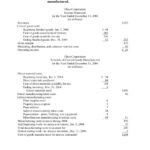
These are the best small business accounting books I’ve found, in no particular order. They equip you with the accounting skills to ensure that every credit card swipe, bank account transaction, or net income statement you encounter makes perfect sense. I’ve walked the journey, understood the intricate ratios, and even tried my hand at quizzes to test my knowledge. This book offers step-by-step instructions on creating and interpreting financial reports and detailed real-world examples to help you apply those learnings. Well, it teaches all the crucial and timeless accounting basics every business owner needs to manage cash and product flow properly.
Each option has its pros and cons, which are outlined in greater detail below. Manage and sell your simple accounting product or service and perform a month-end balancing of accounts. This book is full of accounting definitions of basic accounting terms, sample accounting statements, and a wealth of tips to simplify the accounting process. As a result, you can set up bookkeeping and accounting systems that are efficient and easy to manage.
It automates time-consuming bookkeeping admin for thousands of self-employed people across the UK. With this guide, you stock up on books that can prepare you for strong small business financial accounting. Looking for an ultimate guide that you can reference time and time again? Then grab a copy of Bookkeeping and Accounting for Dummies by Jane Kelly.
Adjust Entries at the End of Each Accounting Period
Barron’s Accounting Handbook is a robust reference, encompassing an expansive coverage of accounting rules, standards, and practices. Siegel and Shim 7 reasons the irs will audit you have created a work that dives into the depth of accounting, making it indispensable for both novices and seasoned professionals. Mullis and Orloff creatively utilize the metaphor of a lemonade stand to make accounting both engaging and comprehensible. It’s an interactive learning journey that transforms accounting from mundane to exciting. When manually doing the bookkeeping, debits are found on the left side of the ledger, and credits are found on the right side.
Software Cons
- Gains include money made from one-time, non-business activities, like selling off old equipment or unused buildings.
- Through simple language and illustrative examples, he unravels the intricacies of financial documentation, making them accessible to readers of all backgrounds.
- It also offers tools and techniques to analyze business data effectively.
- As a business owner, it is important to understand your company’s financial health.
- Accounting for the Numberphobic by Dawn Fotopulos is another of the best accounting books for small businesses.
From there, the total pay is determined with the applicable taxes and withholdings. In the accounting software, the primary journal entry for total payroll is a debit to the compensation account and credits cash. As a small business owner, you have the option of hiring an accountant, recording transactions by hand or using an accounting software to record your business transactions. While cash basis may be easier to use, most businesses choose the accrual basis accounting for recording transactions. Under this method, you record income when you make a sale and expenses when you incur them. This is irrespective of whether you received or paid cash for the product or service.
Overviews of the 17 Best Accounting Books for Small Business Owners
If there are accounting gems you believe should be on this list, I’d love to hear your recommendations. “In the ever-evolving world of accounting, adaptability and continuous learning remain paramount.” Stephen Penman’s “Accounting for Value” delves into the nuances of accounting from an investor’s perspective, emphasizing the role of accounting understanding current assets on the balance sheet in value investing.
It’ll help you forever view your business’s finances in a new light, leading to enhanced profitability and financial security. Mike Piper’s book distills the essence of accounting principles into easy-to-grasp concepts with clear examples. It serves as a quick reference and primer for anyone looking to understand accounting without going through extensive textbooks. In some cases, small business owners may prefer hiring sole practitioners or accounting services firms that specialize in small businesses.

For non-finance managers aiming to bridge the gap in their financial understanding, Sheriff’s guide is an invaluable resource. Every business owner, regardless of the industry, needs a robust understanding of financials, and Oliver’s guide is the perfect foundation. Delve into budgeting techniques, financial report analysis, and strategies to manage and forecast your business finances for maximum profitability. Josh Bauerle’s Accounting QuickStart Guide is a streamlined manual for anyone seeking a solid foundation in both financial and managerial accounting. Bauerle adopts a direct and simplified approach, making accounting accessible to all. Her passion lies in helping business owners conquer their fear of finances.